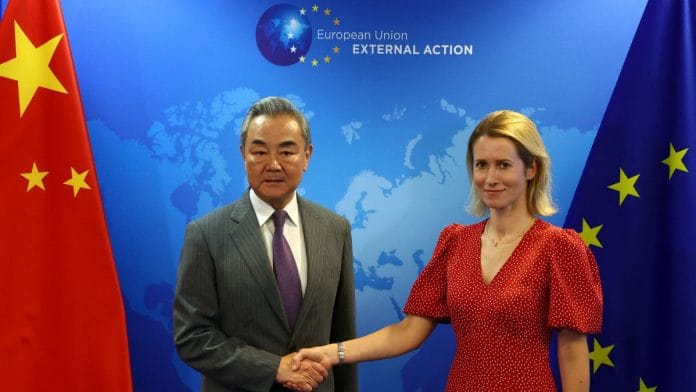New Delhi: China does not want Russia to lose in Ukraine, else the US would shift its entire focus eastward, Chinese foreign minister Wang Yi told EU foreign affairs chief Kaja Kallas Wednesday in Brussels.
According to a South China Morning Post exclusive report, in a four-hour long meeting, Wang pushed back on accusations that China is materially supporting Russia’s war effort—either financially or militarily. Had that been the case, the war would have ended long back, he reportedly said.
Now entering its third year, the Russia-Ukraine war remains a major point of contention between China and the European Union. Brussels has long accused Beijing of supplying dual-use goods to Russia—claims that China firmly denies. Beijing, instead, presents itself as a neutral actor and would-be peacemaker, maintaining relations with both Russia and Ukraine.
The meeting, described as respectful but tense, comes just weeks ahead of a key EU-China summit scheduled for 24–25 July in Beijing and Anhui province. According to the report, Wang suggested to Kallas, that the planned two-day summit could even be cut short, apparently signalling that Beijing is dissatisfied with the EU’s current stance in the lead-up to the meeting.
‘Lessons’ in realpolitik
During the conversation, Wang is said to have offered Kallas—the former Estonian prime minister and a vocal critic of Russia—several “history lessons and lectures”, stressing on Beijing’s view that Washington is preparing to shift its full strategic weight toward China.
US President Donald Trump has repeatedly threatened to withdraw support for Kyiv, and is viewed in many European capitals as having adopted a markedly pro-Russian stance on the war. According to reports, earlier this week, the Pentagon paused shipments of certain air defence systems and precision-guided munitions to Ukraine, citing concerns over dwindling US stockpiles.
The conversation also took place amid worsening friction between the EU and China on trade and sanctions. The bloc is finalising its 18th package of measures against Moscow, which includes blacklisting two small Chinese banks for allegedly helping Russia circumvent sanctions.
Wang issued a clear warning that China would retaliate if the banks were listed.
Yet China has notably refrained from condemning Russia’s invasion and continues to deepen its economic and diplomatic engagement with the Kremlin, an ongoing source of frustration for European officials.
Beijing, which has consistently maintained strong diplomatic and economic ties with Moscow since the invasion, denies accusations of breaching sanctions or exporting dual-use items to Russia.
On trade, longstanding grievances dominated the agenda. The EU has launched a flurry of investigations into what it considers Chinese subsidies, dumping practices and market distortions. Meanwhile, Beijing’s restrictions on the export of rare earth elements and magnets—vital to Europe’s defence and industrial sectors—have halted some European manufacturing lines.
When pressed on the issue, Wang reportedly offered no structural solution, and pointed to administrative improvements instead. “The ministry of commerce has reduced processing time for licenses from nearly six weeks to three,” he is reported to have said. One EU official described his stance as “dismissive”.
The rare earth stand-off has further deepened EU’s concerns that Europe is getting caught in the crossfire of a broader US-China tech rivalry.
Despite the tensions, the official Chinese readout of the meeting struck a much softer tone. “There is no fundamental conflict of interests between China and the EU,” the foreign ministry said. “Europe is currently facing various challenges, but none of them came from China in the past, present and future.”
(Edited by Mannat Chugh)
Also Read: Quad launches new agenda, raises concern on China’s control over critical minerals supply chains






